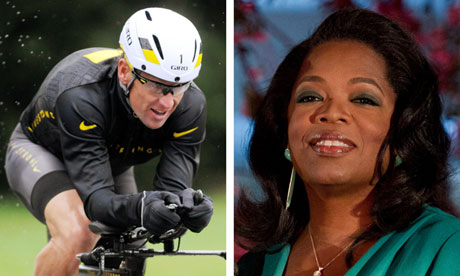
Armstrong's forthcoming TV confession is akin to the sacrament, but he will have to convince us he is sorry to gain forgiveness

Mary Kenny
The Guardian, Thursday 10 January 2013 20.30 GMT

'In return for Armstrong's mea maxima culpa before the great St Oprah, he may well be restored to some kind of grace for having been a sports cheat.' Photograph: Steve Ruark, Charles Sykes/AP
It's a paradox that just as sacramental confession has grown less popular with Catholics, so it seems to have taken root in the secular world. There is counselling; and there are shrinks to whom you disclose the errors of your ways – or at least, the unhappiness that derives from your psychological problems. There are self-help groups, such as the admirable Alcoholics Anonymous, in which addicts confess some of the hair-raising activities carried out while under the influence.
Then there are the public, televised confessions, such as that due to occur between Lance Armstrong and Oprah Winfrey. This is a little more akin to a medieval ritual in which the offender makes a public avowal of his sins and is thus granted forgiveness, and possibly a plenary indulgence. It's an ordeal, but there is shriving at the end of it.
And in return for Armstrong's mea maxima culpa before the great St Oprah, he may well be restored to some kind of grace for having been asports cheat, using drugs to enhance his cycling performance on the Tour de France.
So, is confession good for the soul, cathartic therapy, and a useful way of self-correction? That is what we Catholics have usually felt on emerging from the confession box – though much depended on the confessor, some being liberal, some being stern. If the Blessed Oprah is to be Armstrong's confessor, she will have to be convinced that he is sorry for what he has done, and that he has made "a firm purpose of amendment" to virtue. Traditional confession used to involve what we now call "restorative justice". If you confessed to stealing money, you were enjoined to restore what you had stolen; or, if you couldn't afford to pay back the whole lot, then whatever was manageable. This restorative element was essential to the sinner's recovery process: by restoring moral order he gains self-worth.
Thus will Armstrong agree to restore the $11m that an American insurance company claims he now owes? Will he be redeemed in the eyes of the public by "making a clean breast" of his failings?
There are major differences between public confession and the private kind. While the New Testament tells us that, on the last day, our sins will be shouted from the rooftops, in the meantime we are permitted to recount these sins in confidence and under the unbreakable "seal of the confessional".
Remember the adorable Montgomery Clift in Hitchcock's I Confess – the sensitive priest who refuses to break the seal even under the threat of death? The idea here was to give the penitent a safe and confidential space in which to talk, and the notion was usefully transferred to counsellors and psychoanalysts.
This protocol of confidentiality is now somewhat dented: if you go to a counsellor these days she will tell you that if you have broken the law, either by involvement with terrorism, or a paedophile offence, she will be obliged to inform the authorities. I daresay this is a well-meant measure of security, but it is regrettable in some respects: I have spoken to psychiatrists who are concerned that paedophiles who genuinely want to be helped to overcome their orientation will be too anxious to seek treatment, because they fear it could be put into the public realm.
After the clerical paedophile scandals in Ireland, the Irish justice minister,Alan Shatter, said that the seal of the confessional could no longer hide the offences of those who sexually abuse children – priests must reveal what they hear in confession. This has not yet been enforced by law, but it may still be introduced. Granted, paedophile offenders should be brought to justice. But there is also much to be said for someone confronting an agonising personal problem in confidence.
Public confessions on TV, via social media, and as a celebrity stunt to gain sympathy (or regain a wife, as with Tiger Woods) have something of the same components as the traditional confessional rite – except discretion. And as there may soon be no such thing as a private life, perhaps all our sins will be shouted from the rooftop well before judgment day.
No comments:
Post a Comment